Rachel Blackmon Bryars: ‘School choice’ also means ‘tax choice’ in Alabama

It’s back-to-school season and for some parents, this is a happy time. But for those whose children are stuck in underperforming schools, or schools where they are bullied or are in danger, this is a heartbreaking time, especially if they cannot afford to move or go to private school. “There was fighting every day. People wanted to shoot me, kill me, and everything,” said Calvin Coleman in a speech about his experiences at his Mobile public high school. Did you know that you, or your company, can help students like Calvin by donating a portion of what you already owe in state income taxes to a program that funds scholarships for low-income families in Alabama? “When my son Carlos was in the fifth grade, he was constantly bullied and I wanted to desperately put him into a private school,” wrote Nyenya Webster of Montgomery in Alabama Daily News. Every day was a struggle, she added. “I was at a loss as to what to do to help my son.” Then Webster learned about the tax-credit scholarship program created in 2013 by the Alabama Accountability Act that serves roughly 4,000 low-income, mostly minority Alabama students. She applied, and Carlos received a scholarship to attend Success Unlimited Academy in Montgomery. “Success Unlimited has been a lifesaver for my son,” Webster wrote. “He … is now considering college. My son never talked about going to college before Success.”For those who want to help other Alabama families break the cycle of poverty through education, it’s a no-brainer. “For a donor, it doesn’t cost them anything,” said Warren Callaway, executive director of Scholarships For Kids, one of the scholarship granting organizations funded by the program. That’s because a tax credit is different from a charitable contribution. When you make a charitable contribution to a non-profit organization, you deduct a portion of that on your income tax. However, a tax credit allows you to take a dollar for dollar reduction in your state income tax. “Basically, donors are redirecting some of their state income tax liability to a [scholarship granting organization],” Callaway said. “So, if you give $100 to us, you can reduce your state income tax by $100.” Who benefits from the donation? “The average household income for these students is under $30,000 so these are families that would have no other way of choosing the school that is best for their child,” said Ryan Cantrell, director of state strategy and political affairs for the American Federation for Children, during an interview of the 1819 podcast. Higher-income families have always had school choice, Cantrell said, but “it’s the low-income families who get stuck with no options in under-performing schools or schools that don’t work for their child.” There are $30 million in tax credits available and, so far, only about a third have been claimed, according to the Department of Revenue’s My Alabama Taxes website. Here’s how you can reserve your tax credit before the December 31, 2019, deadline: Step 1: Estimate how much income tax you or your business will owe Alabama next year by checking how much you paid last year. Individuals and corporations can donate up to 50 percent of their tax bill, and while individuals are limited to $50,000, corporations are unlimited. Step 2: Visit the My Alabama Taxes website and follow instructions for reserving an Alabama Accountability Act tax credit. Step 3: Send a check to one of the seven scholarship granting organizations in Alabama within 30 days. Step 4: When you do your taxes next year, fill out an Alabama Department of Revenue Schedule AATC form to reduce your income tax bill by the amount you donated. For more help, individuals may call the Alabama Department of Revenue at 334-353-0602 or 334-353-9770, and corporations may call 334-242-1200. You’re already going to have to write a check for your state income taxes. Why not control where some of that money goes, especially when it has the power to change lives? “It was a relief that nobody would understand,” said mother-of-five Alleane West in an Alabama Opportunity Scholarship video about the program’s impact on her family. “You know, you’re a single mom with boys trying to not make them a statistic.” Rachel Blackmon Bryars is a senior fellow at the Alabama Policy Institute. Connect with her at rachel@alabamapolicy.org or on Instagram @RachelBlackmonBryars.
Bradley Byrne: Giving our students the best education possible

“What do you want to be when you grow up?” This question is probably the single most-asked question of any child throughout the world. Here in the United States, many children are able to achieve their dreams through hard work, dedication, and a quality education. But, for some here in our own country, hard work and dedication are not enough when it comes to circumstances out of their control like where they live or how much their family makes. Too many students find themselves stuck in failing schools. Every child has boundless individual potential, and we must do everything we can to ensure they have the opportunity and freedom to realize that potential. To do that, we must ensure all children have access to choice in education. Education has always been a passion of mine. In fact, it was concerns over public education that first motivated me to run for office and work to make a difference. As a first-generation college graduate, I’ve seen firsthand the power a quality education can have on an individual’s life. So, I have always been an advocate for public education and worked to make sure our schools have the resources they need to do help educate our students. I’ve also fought to limit the heavy hand of the federal government in our classrooms, in an effort to make sure decisions are made by local and state officials who best understand their students. Whether it was serving on the Alabama State Board of Education or more recently as a member of the House Education and Labor Committee, I have made it a priority to put forward solutions to create a better future for our nation’s children. Most recently, I worked with the Trump Administration to introduce the Education Freedom Scholarships and Opportunity Act. This legislation will give students and parents in Alabama and around the country the freedom they deserve to make educational decisions that are right for them. The Education Freedom Scholarships and Opportunity Act was developed in consultation with Education Secretary Betsy DeVos and Senator Ted Cruz as the Trump Administration’s leading education proposal. Our bill responds to President Trump’s State of the Union call for greater school choice and builds upon the model that has already been successful in Alabama. Every student in America should have the opportunity to receive a high-quality education, and we can help accomplish that goal through a new federal tax credit. Our bill will create a non-refundable federal tax credit for contributions from individuals and businesses to state-identified nonprofits called Scholarship Granting Organizations. These scholarships can be used to expand students’ access to a variety of educational opportunities, from advanced or remedial courses to private and home schooling to CTE opportunities. It puts control in the hands of states and localities rather than the federal government when it comes to educational choice and scholarships. Very important to me, the bill does not take a single penny away from public education. I know the vast majority of students in Alabama and in the United States attend public schools, like my children did, and I will remain steadfast in fighting for our traditional public schools, teachers, and students. Through the Education Freedom Scholarships and Opportunity Act, we will increase opportunity for families to make informed decisions that work for them and their individual needs, rather than cookie cutter solutions that don’t work. By providing greater freedom in education and continuing to fight for our nation’s children, we can help every student realize their goal of “what they want to be.” In doing so, we can make our state and our country even stronger. Bradley Byrne is a member of U.S. Congress representing Alabama’s 1st Congressional District.
Bradley Byrne proposes federal tax credits to advance school choice
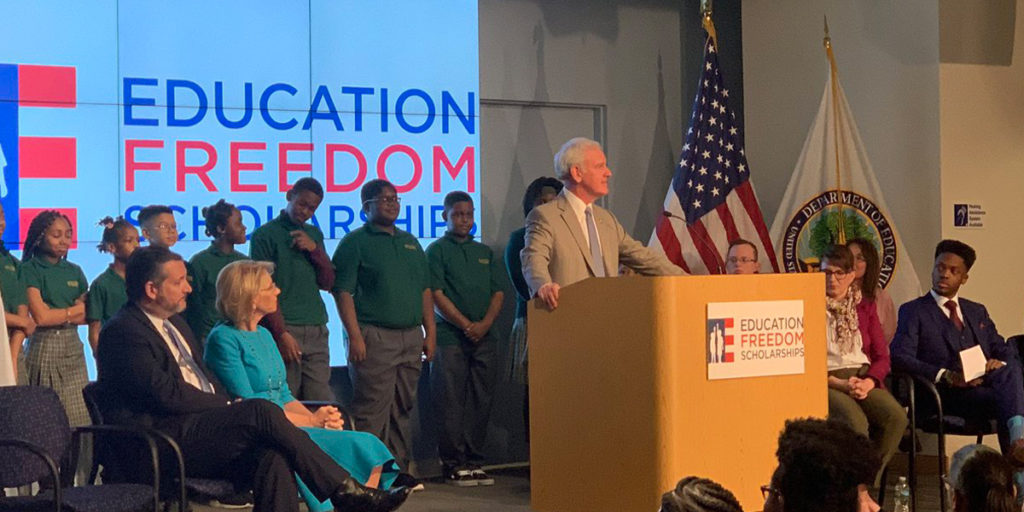
Alabama 1st District U.S. Rep. Bradley Byrne took the lead on Thursday, joining his Senate colleague U.S. Sen. Ted Cruz and Education Secretary Betsy DeVos at a press conference announcing legislation that supports the Trump administration renewed its push for school choice. At the press conference, Byrne announced the Education Freedom Scholarships and Opportunity Act , which would give students and parents in Alabama and around the country the freedom they deserve to make educational decisions that are right for them. The legislation does this by offering $5 billion a year in federal tax credits for donations to scholarships for private schools and other educational programs. “Every student in America should have the opportunity to receive a high quality education, and we can help accomplish that goal through a new federal tax credit,” said Byrne. “This model has succeeded at creating opportunity for students in Alabama, and I am hopeful through this legislation we can create similar opportunities for students around the country. Byrne, continued, “I applaud the leadership of President Trump and Secretary DeVos to expand choice and freedom in education, and I am committed to working with them and Senator Cruz to see this legislation across the finish line.” The bill was developed in consultation with DeVos and Cruz, and is the Trump Administration’s official school choice proposal. It responds to president’s State of the Union call for school choice and builds upon the Scholarship Granting Organization (SGO) model that has already been successful in Alabama. DeVos says the legislation puts “individual needs of students above all else.” “Every student in America deserves to learn in an engaging, meaningful and personalized way. No student should be denied that opportunity simply because of where they live or their family income,” Secretary DeVos explained. “Education Freedom Scholarships will make a historic investment in our students and their futures, finally putting the individual needs of students above all else. I want to thank Congressman Byrne for his commitment to education freedom and for his continued leadership in Congress on this important issue.” According to Byrne, the Education Freedom Scholarships and Opportunity Act will: Create an non-refundable federal tax credit for contributions from individuals and businesses to state-identified nonprofits called Scholarship Granting Organizations (SGOs). Provide for the granting of scholarships to expand students’ access to a variety of educational opportunities, from advanced or remedial courses to private and home schooling to CTE opportunities. Increase opportunity for families to make informed decisions that work for them and their individual needs. Allow states to control their SGO programs, not the federal government. The Education Freedom Scholarships and Opportunity Act is supported by a variety of stakeholders, including the United State Conference of Catholic Bishops Committee on Catholic Education, Agudath Israel of America, Union of Orthodox Jewish Congregations of America, American Association of Christian Schools, Association of Christian Schools International, American Federation for Children, ExcelinEd, Americans for Tax Reform, & EdChoice.
Rachel Blackmon Bryars: Four myths to dispel during Alabama School Choice Week

Gov. Kay Ivey recently proclaimed this “Alabama School Choice Week” and thousands of families are celebrating reforms created by the Alabama Accountability Act, including scholarships so low-income parents can transfer their children from under-performing schools. Critics of the program, however, will likely respond by repeating some of the many myths about the law. Here are four you’ll probably hear: Myth #1: Scholarships steal money from public schools The Alabama Accountability Act “has directly siphoned more than $140 million from Alabama’s cash-strapped K-12 classrooms,” wrote the Alabama Education Association in a September 2018 edition of the teacher’s union magazine. But public school systems aren’t actually losing money. They are now collecting more money to educate fewer students with the biggest budget in a decade. Overall, the state’s multi-billion dollar education trust fund has grown since the scholarships were first offered, even while enrollment has steadily decreased. Last year alone, tax revenue that funds the education budget grew by nearly half a billion dollars– about three times as much as the scholarship program has spent in six years combined. Also, it costs roughly $9,500 annually to educate a student in public school, according to budget data. But it only costs about $6,500 to educate the same child in private school, which includes the costs of administering the scholarships, according to Warren Callaway, executive director of Scholarships For Kids, one of the largest scholarship granting organizations in the state, and a member of the recently formed Alabama Accountability Act Coalition. “It’s a great deal for taxpayers,” Callaway said. “They’ve given us $146 million and we’ve provided $200 million in education. The cost of education is not fixed because [public schools] don’t have to educate the child we have taken off their hands.” Myth #2: Even high performing schools that don’t have any students transferring out on scholarship still “lose money” “The highest performing school districts lose revenue at the same rate as all other districts,” according to the teachers’ union article. “It does not matter if you have no failing schools in your district. It does not matter if you have no scholarship recipients in your district. All school systems are still penalized under the [program].” Callaway says this is “bogus.” “The AEA tells Mountain Brook City, arguably the best system in the state, that they’ve lost $834,956 due to the Accountability Act,” Callaway said. “That’s hogwash. They haven’t lost a dollar.” Callaway examined state budget data showing Mountain Brook enrollment has largely been static, while state spending on students has gone up. In effect, they’ve received more money than years prior despite the AEA’s claims they’ve lost money. Myth #3: A University of Alabama study proves school choice doesn’t work A state-commissioned study conducted by the University of Alabama’s Institute for Social Science Research found that students using the scholarships performed about as well, on average, as their public school peers. Critics believe this proves school choice doesn’t help students improve academically. But advocates claim this indicates a huge achievement since research shows poverty strongly correlates with poor academic performance – a fact highlighted by the recent release of this year’s failing schools list. “In 72 of the 76 [failing] schools, more than nine out of 10 students are in poverty,” reports Al.com’s Trisha Powell Crain. “Even in the other four, more than half of the students are poor. In every one of the nine K-5 and K-6 elementary schools on the list, every student is poor. The University of Alabama study also showed low-income scholarship students often did better academically than their low-income public school counterparts. “We’ve taken kids who you would predict would be on the bottom side of the bell curve of achievement and we’ve gotten them to the mean,” Callaway said. “I would put the headline of that study, instead of ‘They scored average, ho-hum,’ I would say ‘They scored average, exclamation point!’” Myth #4: The program should be repealed because not all scholarship recipients are zoned for failing schools Students zoned for failing schools are awarded the scholarships first, and any remaining funds are then given to other disadvantaged families in schools that are generally close to the bottom 6th percentile — the state’s definition of a failing school. “Would you want to send your child to a 7th percentile school or an 8th percentile school?” Callaway asked. “The answer is no. Those are still low performing schools.” Overall, there’s a lot about education besides school choice that Alabamians can celebrate this week. Our recently released state report card revealed district and school improvement last year, with more As, Bs and Cs than the year before. Our First Class Pre K program continues to succeed and draw national attention. And Montgomery will open its first charter school this year. None of these achievements, including school choice, would have happened without new ideas and reform. “The Accountability Act wasn’t an initiative to take the place of public education, it was just intended to show there is an alternative way of doing things and to upset the status quo,” Callaway said. No doubt the families celebrating their life-changing opportunity this week thank God that it did. ••• Rachel Blackmon Bryars is a senior fellow at the Alabama Policy Institute. Email her at Rachel@alabamapolicy.org or connect with her on Instagram @rbryars.
Kay Ivey proclaims Jan. 20-26 Alabama “School Choice Week”

Governor Kay Ivey has proclaimed this week, January 20-26, to be Alabama School Choice Week, joining other states around the country in bringing awareness to school choice options available to parents. WHNT 19 News reports that, Andrew Campanella, president of National School Choice Week said, “We’re excited that Alabama families are so passionate about school choice, and we’re encouraged by Gov. Ivey’s support for that,” said Andrew Campanella, president of National School Choice Week. “We wish Alabama families all the best in their celebrations and hope that the planned events and activities will help parents find the educational opportunities that best meet their children’s needs.” More than 40,000 independent school choice events are planned for around the country and abroad, with 750 of those will be held in Alabama. That is a significant increase over last year, in which 548 events were held in the state. National School Choice Week was founded in 2011 as a nonpartisan “celebration of opportunity in education.” In August 2018, the Associated Press reported the findings by Education Next, a journal published by Harvard’s Kennedy School and Stanford University. According to the report, “Forty-four percent of respondents in the poll conducted in May said they support the expansion of charter schools, compared to 39 percent in 2017. The gain of 5 percentage points, however, did not fully offset the drop in support from 51 percent in 2016. When broken down according to party affiliation, 57 percent of Republicans and 36 percent of Democrats voiced support for charter schools, compared to 47 percent of Republicans and 34 percent of Democrats in 2017.” Late last year, Alabama board of education member Ella Bell, a democrat, spoke out during a work session claiming that Alabama’s landmark tax credit scholarship program for low income families was part of an effort to “destroy a whole race of people.” “They took money from the poorest counties in the state to send kids to private school,” Bell claimed, after accusing the program of “stealing” from the state. “That’s just awful.” This claim was disputed in an editorial by Rachel Blackmon Bryars, a senior fellow at the Alabama Policy Institute. Bryars said, “The plain fact today is that the Alabama Accountability Act is a tiny fraction of our state’s education budget, it gives low-income families a sometimes life-altering choice, and almost all of the students receiving scholarships are minorities. We should all be proud of that. Because in the end, this is about what we believe education dollars are for – the system or the student.” . Alabama currently ranks near the bottom in state education rankings.
Poll: Support for school choice growing among Republicans
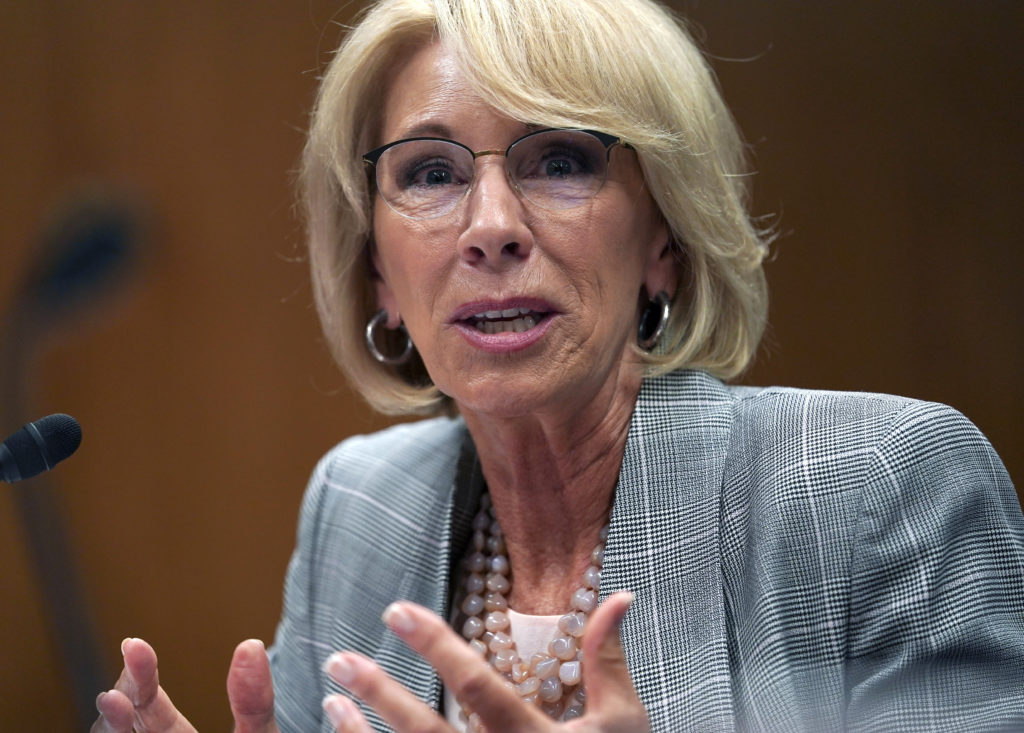
Support for charter schools and private school voucher programs has gone up over the past year, with Republicans accounting for much of the increase, according to a survey published Tuesday. The findings by Education Next, a journal published by Harvard’s Kennedy School and Stanford University, come as Education Secretary Betsy DeVos promotes alternatives to traditional public schools. Forty-four percent of respondents in the poll conducted in May said they support the expansion of charter schools, compared to 39 percent in 2017. The gain of 5 percentage points, however, did not fully offset the drop in support from 51 percent in 2016. When broken down according to party affiliation, 57 percent of Republicans and 36 percent of Democrats voiced support for charter schools, compared to 47 percent of Republicans and 34 percent of Democrats in 2017. “Support is up among Republicans for various strategies to expand school choice, and the Trump administration’s embrace of those policies is a likely explanation,” said Martin West, associate professor of education at Harvard University and a co-author of the report. Nina Rees, president of the National Alliance for Public Charter Schools said the findings “demonstrate through the educational choices they make for their children – families want high-quality charter school options for their kids. “Above all else, parents care that their child has access to an excellent school, and as education advocates it is our job to ensure that wish becomes a reality,” Rees added. Robin Lake, director of the Center on Reinventing Public Education, noted that support for charters has risen mostly among Republicans. “I hate to see an issue turn into a partisan question,” Lake said. “I don’t think that an education policy that’s designed to get better outcomes for kids should ever be a partisan issue.” Support for publicly funded vouchers given to low-income families to help them pay tuition at private school rose from 37 percent to 42 percent over the past year. The Education Department welcomed the results of the poll. “The data consistently show that parents want more education options for their kids and when they are empowered with options, they like it and their kids benefit,” said press secretary Elizabeth Hill. “Education freedom is the future.” Meanwhile, Americans seem to be more satisfied with their local police and the post office than with their neighborhood school. While 51 percent of respondents said they would give their local schools a grade of A or B, 68 percent gave the local post office a similar grade and 69 percent the local police. “It makes sense that only 50 percent of Americans are giving their public school a good grade of an A or a B that they would express support for alternatives to those public schools,” said Patrick McGuinn, a professor of political science and education at Drew University. In the Black Lives Matter era, African-American respondents gave their local police much lower marks than other respondents, but their views of their local schools were even worse. Thirty-nine percent gave their local schools an A or a B, while the local police force received such marks from 43 percent of African-American respondents. The study also found that many Americans favor raising teacher salaries and increasing school funding in the aftermath of teachers walking out of schools in six states earlier this spring to protest pay and other issues. Informed about average teacher earnings in their state, nearly half said they support raising teacher pay. That number was 67 percent when respondents were not told explicitly how much their local teachers were making. Nationally, the average teacher’s salary was $58,950 in 2017, according to the National Center for Education Statistics. “The sense of economic insecurity for teachers is very strong and there is growing support for higher pay, not just from teachers but from the broader community,” said Evan Stone, CEO of Educators For Excellence, a teachers’ advocacy organization. West said that while many believe teachers should be making more, there is disagreement over whether they should be compensated based on how much their students learn or using some other metric. “To the extent that the debate moves from how much are teachers are paid to how they are paid, there is potential for continued conflict,” West said. The Education Next survey was based on interviews with 4,601 adults across the country. The margin of error was 1.4 percentage points. Republished with permission from the Associated Press.
Betsy DeVos touts school choice, STEM as education priorities
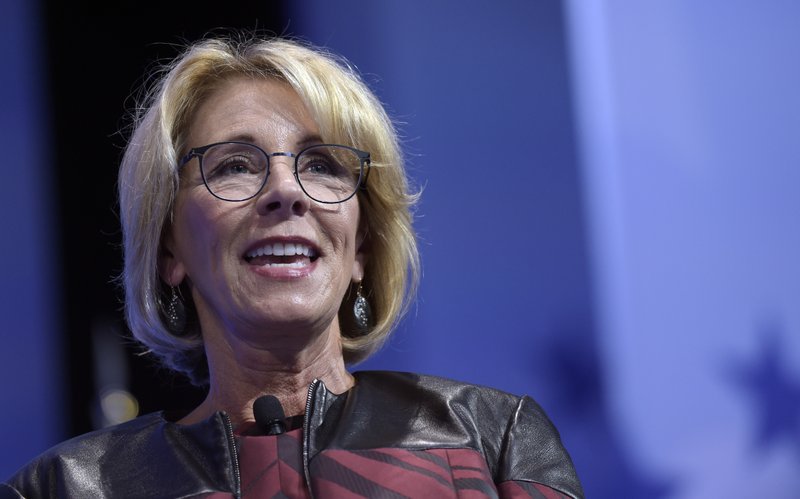
Education Secretary Betsy DeVos has put forth a new set of priorities for states, schools and universities competing for federal grant money. The priorities include school choice, science and technology, special education and school safety. The Education Department awards approximately $4 billion per year in new and continuation competitive grants across some 80 programs, the agency said Thursday. Education secretaries have historically used these competitions to push their priorities. “It’s a little nudge,” said Chad Aldeman, an associate partner at Bellwether Education Partners. “This allows the department to nudge the education field toward these priorities.” There are a total of 11 priorities on DeVos’ list. After receiving public comments on these proposals, the agency will settle on one or several of them. Promoting school choice has been a key focus of the Trump administration. School choice refers to providing parents and their children with options besides their district public school, such as charter schools, vouchers or education savings accounts to attend private schools. DeVos and her supporters say these options better serve students’ individual needs and can benefit children whose local schools are underperforming. Critics say charter and private schools don’t necessarily outperform neighborhood schools and they lack accountability mechanisms. Sen. Patty Murray of Washington, the top Democrat on the Senate committee devoted to education, criticized DeVos’ priorities as a way to privatize education and said the department should be focusing on supporting local, public education. “Since her confirmation hearing, I have voiced concern that Secretary DeVos would abuse her position to prioritize privatization, and that’s exactly what we’re seeing,” Murray said. “Instead of listening to the millions of students, parents and teachers who stood up against her extreme ideological agenda, her proposal will allow her to prioritize applicants that would siphon taxpayer funds away from the public schools that serve the vast majority of students.” Republished with permission from the Associated Press.
Betsy DeVos pushes for ‘most ambitious expansion’ of school choice, but offers few details

The Trump administration is proposing “the most ambitious expansion” of school choice in American history, Education Secretary Betsy DeVos announced Monday while giving few details on how the program would work. “We must offer the widest number of quality options to every family and every child,” DeVos said in a speech in Indianapolis. “We stand on the verge of the most significant opportunity we have ever had to drag American education out of the Stone Age and into the future.” DeVos gave few specifics other than to say that the state of Indiana could serve as a model. Indiana has one of America’s largest and fastest-growing school voucher programs to give low-income families scholarships to help pay private school tuition. DeVos insisted that decisions on school choice must be left for states, not the federal government, to make. But she also warned states against boycotting reform. “If a state doesn’t want to participate, that would be a terrible mistake on their part. They will be hurting the children and families who can least afford it,” DeVos said at an event hosted by the American Federation for Children, the school choice advocacy group she used to lead. “If politicians in a state block education choice, it means those politicians do not support equal opportunity for all kids.” Earlier this month, President Donald Trump asked Congress to work with him on expanding charter and private school voucher programs nationwide, but he gave no specifics. School choice advocates are divided over whether to push charter schools and vouchers on the federal or state level. Voucher and charter school programs are facing fierce criticism from teachers unions and many Democrats, who believe they drain resources from already underfunded public schools while failing to produce clear academic gains. “Once again, Secretary DeVos is putting her extreme privatization agenda ahead of our students,” said Washington Sen. Patty Murray, the top Democrat on the Senate Health, Education, Labor and Pensions Committee. “DeVos claims she wants to provide more choices for students and families, but in reality, voucher programs siphon taxpayer funds from public schools to unaccountable private and religious schools that often leave children worse off.” Republished with permission of The Associated Press.
Poll: Most unfamiliar with school choice but like the idea

Even as fierce political battles rage in Washington over school choice, most Americans know little about charter schools or private school voucher programs. Still, more Americans feel positively than negatively about expanding those programs, according to a new poll released Friday. “I wonder what the fuss is about,” said Beverly Brown, 61, a retired grocery store worker in central Alabama. Brown, who doesn’t have children, says American schools need reform, but she is not familiar with specific school options and policies. “Educational standards have to be improved overall.” All told, 58 percent of respondents say they know little or nothing at all about charter schools and 66 percent report the same about private school voucher programs, according to the poll conducted by The Associated Press-NORC Center for Public Affairs Research. Charters are schools funded by taxpayer money, but they operate independently of school districts and thus have more freedom in setting their curriculum and hiring staff. Vouchers are publically funded scholarships given to low-income families to help cover tuition in private schools, including religious ones. Using taxpayer money to aid struggling public schools or diverting it to fund more charter schools or make private schools available to more families has been hotly debated since Donald Trump was elected president. During the campaign, Trump promised to fund a $20 billion school choice program. He picked a long-time charter and private school advocate, Betsy DeVos, as his education secretary. Last week the president welcomed a group of students who were voucher recipients to the White House and asked Congress to work with him to make school options available nationwide. Those efforts face fierce resistance from Democrats and teachers unions, who say that school choice drains funds from public schools while leaving charter and private schools unaccountable in terms of academic standards and civil rights protections. Patrick McGuin, an education professor at Drew University, said he was surprised by the fact that most Americans had little knowledge about school choice options. “That’s pretty remarkable given the growth and high-profile politics around charters,” McGuin said. “As much as policymakers are talking the heck about this, the debate really hasn’t permeated the general public’s discussion yet.” Charter schools currently operate in 42 states and the District of Columbia. D.C. has only the federally funded voucher program, while 30 states have voucher or similar education choice programs. Even though they are unfamiliar to many, Americans have largely positive reactions to charter schools and vouchers. While 55 percent of respondents say parents in their communities had enough options with regard to schools, about 4 in 10 feel that that the country in general would benefit from more choice. Forty-seven percent say they favor opening more public charter schools, 23 percent are opposed, and 30 percent feel neutral about it. Meanwhile, 43 percent of respondents support giving low-income families tuition vouchers for private schools, 35 percent are opposed and 21 percent don’t have a strong opinion either way. Republicans are slightly more likely than Democrats to favor opening more charter schools, 53 percent to 42 percent, but there is little partisan variation for voucher programs. At the same time, opposition to vouchers is highest among those who have heard the most about them. John Rekers, a 46-year-old mortgage broker in California, has five kids and all of them are attending charter schools. He believes charter schools are more innovative and progressive. “They are not so oriented to sitting at desks and doing stuff,” he said. “The charter school is much better oriented in teaching children,” Rekers said. “They have higher standards.” Marc Culbreath, a janitor in Philadelphia, spent several years renting a house in the suburbs so that his children could go to quality public schools, but when the family moved into the city, they were appalled by neighborhood schools. “Kids in the city — their public schools are terrible,” Culbreath said. Culbreath sent his son, now in 10th grade, to a charter school and he is now on track to go to college. “They treat the kids in the city same as they treat the kids in the suburbs,” he said of the charter school. But Madolyn Stall, 22, a college student in Kansas, doesn’t support voucher programs. “If you cannot afford to go to a private school, then public school is fine,” she said. “I don’t really want to pay more of my tax money to send people to private school when they can go to public school.” About 7 in 10 respondents feel that both charter schools and private schools funded with taxpayer money should meet the same education standards as public schools. School choice critics point to the fact that most private school don’t need state accreditation to operate and that some private schools teach creationism in science classes. Still, Americans are more likely to say that private schools, both locally and nationally, provide a good quality of education than say the same of public schools. The AP-NORC poll of 1,036 adults was conducted April 20-23 using a sample drawn from NORC’s probability-based AmeriSpeak panel, which is designed to be representative of the U.S. population. The margin of sampling error for all respondents is plus or minus 4.0 percentage points. Respondents were first selected randomly using address-based sampling methods, and later interviewed online or by phone. Republished with permission of The Associated Press.
Donald Trump to visit private school to promote school choice
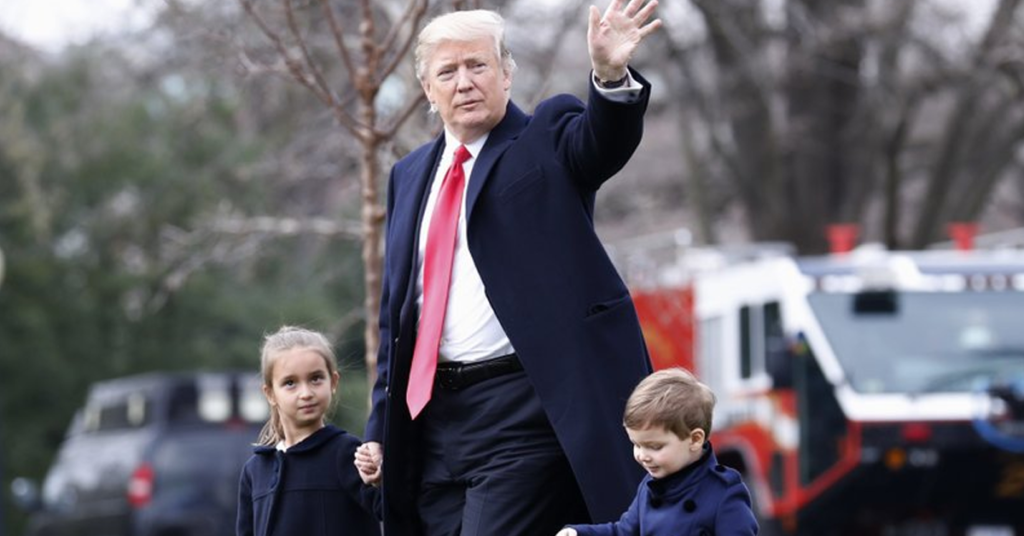
President Donald Trump will be visiting a private, religious school in Florida on Friday, signaling that his education agenda will focus on school choice. The president will tour St. Andrew Catholic School in Orlando, where he is expected to drop in on classrooms, and meet with parents, teachers and administrators, the White House said. This will be Trump’s first visit to a school since becoming president and it gives a strong indication of where his priorities lie. Teachers unions were quick to criticize the plan, saying it shows Trump’s hostility toward public schools and his intention to turn education into a profit-making industry. During a speech to Congress this week, Trump called education “the civil rights issue of our time” and asked legislators to pass a bill that would fund school choice for disadvantaged youth, including minority children. He did not offer any details. Among his guests at the speech was Denisha Merriweather, who used Florida’s school voucher program to attend a private high school that she credits with turning her life around. Many of St. Andrew’s students attend the school using the same voucher program as Merriweather, said White House spokesman Ninio Fetalvo. Trump’s education secretary, Betsy DeVos, who was traveling with the president, has a long history of promoting charter schools and vouchers. Teachers unions strongly opposed her nomination, fearing that she intends to defund public schools. White House spokesman Sean Spicer said earlier this week that education is “a top priority” for the president. “He has said many times before that education has the ability to level the playing field for the next generation,” Spicer said, adding that Trump “is determined to provide choice for every parent and opportunities for every child, regardless of their zip code.” St. Andrew Catholic School is a private institution that teaches 350 children from pre-kindergarten to eighth grade. The school defines its mission as “developing the students’ spirituality and creativity in order to be disciples of Christ in the 21st century.” A photo on the school’s website shows a smiling boy in school uniform holding a sign that reads “My goals: College. Heaven.” Randi Weingarten, president of the American Federation of Teachers, said that by visiting a private, Catholic school Trump was continuing his “ideological crusade” and advancing his plan of “criticizing, undermining and proposing the defunding of public schools and instead trumpeting private alternatives.” Weingarten said that in many cases voucher programs — publicly funded scholarships given to low-income families to help them cover private school tuition — have not improved children’s academic outcomes. She added that voucher programs are often not transparent in how they spend public dollars and in what the kids are taught. “To borrow a word from President Trump — it’s so ‘sad’ that the president and his secretary of education have demonstrated such an antipathy toward public schools,” Weingarten said in a statement. “Trump is in Florida to push choice and a backdoor voucher proposal as a way to turn education into a commodity.” Republished with permission of The Associated Press.
Del Marsh: Why I fight for school choice
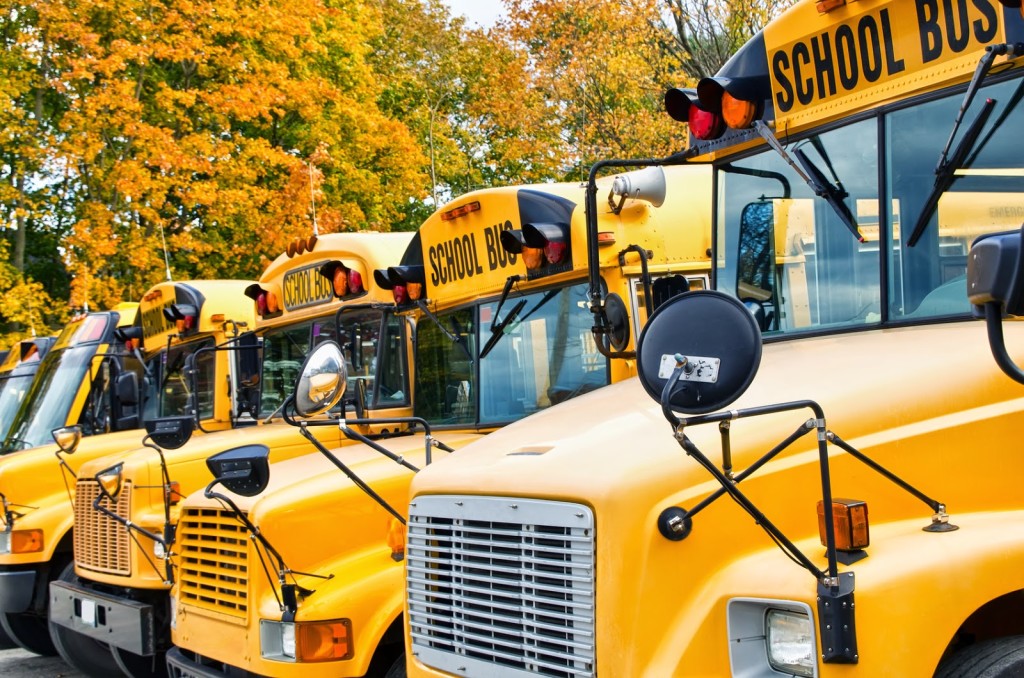
With the election of President Donald Trump, school choice has been at the front of every discussion affecting education policy in the United States. I am pleased to say that the Alabama Legislature has been opening up choice for students and parents long before it was part of the national discussion. I am proud to have introduced sweeping legislation that allows the creation of public charter schools and the Alabama Accountability Act (AAA), which makes it easier for parents to send their children to different schools when they have no option. Let me be clear, the school choice discussion is not an attack on teachers, support staff, and administrators. I truly believe that on the whole we have some of the best teachers in the country who show up every day and work hard and follow their passion for educating children. I do have a problem with those special interest groups who are more interested in maintaining a status quo in education that favors them rather than actually doing anything make sure our schools and children are consistently improving and growing as students. With every reform I have promoted, I have welcomed any and all interested parties to help craft legislation so that it meets the needs of everyone involved. Many of the organizations entrusted to represent the values of our professional educators have little interest in assisting with reforms of any kind and work overtime to kill any change no matter how positive it may be to parents or students. Especially if those changes involve giving parents a choice. Recently I filed SB123 in the Alabama Senate to amend the Alabama Accountability Act. The AAA provides parents of children in failing schools the ability to transfer to non-failing schools. The most popular is through the use of a refundable income tax credit made by Alabamians to a Scholarship Granting Organization (SGO), which in turn pays the tuition for children in a failing school to attend a non-failing or private school. Survey after survey shows a majority of Americans support school choice. Those with means exhibit school choice by moving to areas where their public schools excel or pay for a private school, as I am sure the directors and bureaucrats of those opposed already do. However, for far too many, access to a quality education is solely determined by their ZIP code. The Alabama Accountability Act is a success. Ask the parents. Ask the children. Now, in a small effort to modify the bill at the cost of zero dollars to the this year’s education budget, the entrenched special interest groups who have overseen Alabama’s slide into the bottom of nearly all education achievement rankings want to deny the thousands of parents and children on waiting lists a choice, and force them to stay in schools they do not want to be in. They want children in foster homes to lose their scholarships if they are moved to a new home by the system. That is unconscionable. It is wrong. It is immoral. I do not support school choice to make teachers look bad, nor do I support school choice to so that anyone may profit from it. I support school choice for the parent who wants their child to have a better life that starts with quality education and for the student who is looking for a hand up to get where they want to go in life. Even if only one child is able to achieve their potential and realize their dreams because they were able to improve their situation, it will be well worth the vicious political attacks launched by the defenders of the status quo. I want every Alabamian to have a quality education. I agree with President Trump that for some, it is in public schools, for others, it is in private schools and home schooling. But only the parent knows best, and I trust them over Montgomery bureaucrats and lobbyists. ••• Anniston-Republican Del Marsh is a member of the Alabama Senate since 1998, representing the 12th District. He serves as the Senate President Pro Tempore.
Kevin Glass: The next battlegrounds for school choice: stubborn red states

The sweeping successes of Republicans nationwide in the 2016 elections presents a huge opportunity for the school choice movement. Republicans have historically been more friendly to school choice than Democrats, and they now have 33 governorships and full control of 32 state legislatures. Unfortunately, Republican control doesn’t always equal the best outcomes for students. In places like Texas and Mississippi, hundreds of thousands of students sit on waitlists for choice programs despite Republican control in both of those states. “Mississippi is a little late to the school choice dance,” education activist Kevin Chavrous said, according to Mississippi Watchdog. The state has a choice program, but that “only a small percentage of Mississippi students are able to take advantage, and opportunities need to be expanded.” Reformers there are working with legislators. Watchdog Texas reported that the state “remains a laggard” in this important area, and that the Republican speaker of the house has been an opponent of expansion of school choice programs. The status quo policies are what keep a reported 120,000 students on waitlists to get out of failing public schools. At the very least, education reformers may soon have less opposition from the federal level to their reform efforts. President Trump’s nominee for secretary of education, Betsy DeVos, has been a supporter of choice programs across the country, from charters to education savings accounts to opportunity scholarships. The federal government does not and should not have power over state and local education authorities when it comes to school choice, but it’s still comforting to know that the Department of Education won’t be getting in the way. It’ll be a welcome change from the previous administration, which frequently paired noble goals with questionable tactics. The Obama Department of Education’s school choice policy was frequently paired with strings attached that made many of them unsustainable. The capacity for choice programs has increased in the last few years, but not by nearly enough to keep up with the incredible demand. And, hopefully, a Republican administration will be able to stop the shameful shuttering of choice programs that occurred during the Obama administration. Parents want more choice, as evidenced by the near-record waitlists for choice programs around the country. While there has been progress made in freeing parents and students from ZIP code determinism in recent years, a lot of progress still remains, as evidenced by Texas and Mississippi. A new year after a big election, however, means that opportunities exist nationwide. ••• Kevin Glass is director of outreach and policy at The Franklin Center and was previously managing editor at Townhall.


